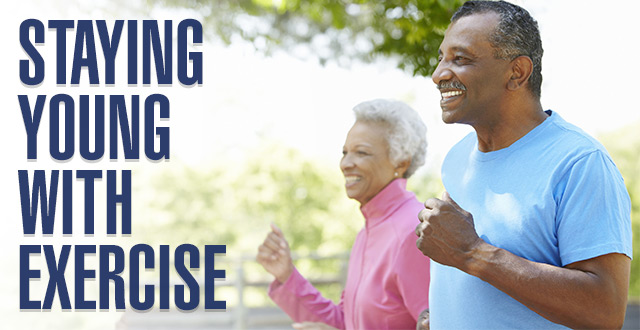Sure, exercise keeps you looking good physically, but did you know it can also keep your brain looking young? A new study published in the journal, “Neurology”, measured the cognitive abilities of nearly 1,000 older adults—average age 71—and found that the brains of those who exercised moderately looked 10 years younger than those who did not exercise regularly.
The University of Miami research also noted there was less of a cognitive decline in those with a more active workout schedule.
It’s never too late to begin a healthier lifestyle and age should never be a deterrent to physical fitness. Exercise has been shown to slow down the rate of aging and there is even a recommended exercise for a variety of illnesses and ailments.
Sore joints or arthritis pain, try aqua fitness. According to the American Council on Exercise, exercising in water makes you feel about 90 percent lighter, and because of that, it is an excellent low-impact exercise that can be beneficial for older adults with limited mobility.
If you suffer from an achy back, experts recommend low-impact exercises such as walking and cycling. You’ll be able to improve your strength and your core as well as increase muscle function.
For older adults with osteoporosis, high impact, weight bearing exercises are most beneficial. Try hiking, dancing or jogging.
There is also an abundance of evidence confirming exercise is a major factor in the reduction of approximately two dozen health conditions, including dementia, cancer, heart disease and Type 2 diabetes.
Lack of activity is linked to more doctors’ visits, hospitalizations and more use of medicines for a variety of illnesses as well.
Be sure to keep non-traditional activities in mind when you want to work up a sweat. Ping Pong has been shown to burn 200-300 calories per hour. Virtual gaming on the Wii provides players with cardiovascular exercises as well as improved hand-eye coordination.
Experts suggest the following tips for older adults wanting to begin a fitness regimen:
- Consult with your doctor before beginning any exercise program, especially if there is a history of heart conditions.
- Start slow and build your endurance. For example, Walk for five minutes, then gradually increase your time.
- Vary your workout by including aerobics and strength training.
- Be sure to hydrate especially during the summer months and maintain a balanced diet.
- Listen to your body and know your limitations. It’s better to workout consistently over several days than to push yourself too much and ultimately need numerous days of inactivity to recuperate.
- Consider a workout partner. He or she will keep you accountable and you’ll be less likely to skip workouts if you know someone is depending on you to show up.
- Check out apps on your phone or tablet. There are numerous apps specifically designed to help keep your workout consistent. From RunKeeper that measures your mileage and calories to Pact, which pays you for successfully completing a workout, the options are endless.
Lace up those sneakers and hit the pavement or the gym. You’ll be maintaining your youth—both physically and mentally!

